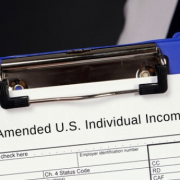9 Tax Changes To Know Before Filing Your 2016 Return
 The tax-filing season is officially open, and you should have your W-2 and 1099 forms in hand any minute.
The tax-filing season is officially open, and you should have your W-2 and 1099 forms in hand any minute.
The good news for most taxpayers: Preparing 2016 tax returns will be a lot like preparing 2015 returns, except with different numbers.
“There are not too many changes,” says Lisa Greene-Lewis, a certified public accountant and tax expert for TurboTax and a U.S. News contributor.
Like last year, taxpayers will have an additional three days to file their returns. Since April 15 falls on a Saturday, the deadline is extended to the next business day, which would be April 17. However, because that is when the District of Columbia celebrates Emancipation Day, Tax Day will be Tuesday, April 18.
While the deductions and rules for filing will roughly remain the same, some of the numbers and tax brackets will be different, after being adjusted for inflation.
“You can’t assume that what you relied on last year is necessarily the same,” says Barbara Weltman, an attorney and a contributing editor for “J.K. Lasser’s Your Income Tax 2017.”
With a new president in office who has promised tax cuts, no one knows yet whether 2017 taxes will be dramatically different. But Jeff Schnepper, a tax attorney in Cherry Hill, New Jersey, and author of “How to Pay Zero Taxes 2017: Your Guide to Every Tax Break the IRS Allows,” says that some of his clients chose to defer income to 2017.
“In 2017, there’s an expectation of the rates going down,” Schnepper says.
Here are nine changes to be aware of when you file your 2016 tax return.
1. Lower Mileage Rate
You can get a tax break for using your vehicle for business, charitable, moving or medical purposes, and you can deduct the actual costs or use the IRS mileage rate. For 2016, the rate for business mileage is 54 cents per mile, down from 57.5 cents in 2015. For medical or moving purposes, the rate is 19 cents, down from 23 cents. The rate for charitable purposes remains 14 cents. For 2017, the rates will fall again, to 53.5 cents for business miles and 17 cents for moving and medical purposes.
2. Refund May Be Delayed
Taxpayers who claim the Earned Income Tax Credit or the Additional Child Tax Credit will have their refunds withheld until Feb. 15. That’s to give the IRS more time to detect fraud and errors in claiming the credit. The delay is required by the new Protecting Americans from Tax Hikes law passed in 2015.
3. To Get IRS Help Need An Appointment
The IRS taxpayer help centers will no longer accept walk-ins. You can still find in-person help and make an appointment. If your center is in a federal office building, you may not be allowed to enter carrying a cellphone with a camera.
4. Tax Bracket May Have Changed
The maximum 39.6 percent tax rate kicks in for single taxpayers making at least $415,050 and married taxpayers filing jointly with an income of at least $466,950. That’s up from $413,200 and $464,850, respectively, last year. Income levels for other tax rates – which are 10 percent, 15 percent, 25 percent, 28 percent, 33 percent and 35 percent – also have been adjusted slightly.
5. Personal Exemption Is Higher
This year’s personal exemption is up from $4,000 to $4,050. That exemption is decreased for those with an adjusted gross income of $259,400 for single filers and $311,300 for a married couple filing jointly and goes away completely at $381,900 for single filers and $433,800 for couples filing jointly.
6. Larger Earned Income Tax Credit
The maximum credit for 2016 is $6,269, up from $6,242 for taxpayers who have three or more children. The formula for awarding the tax credit includes income, dependents and other factors. The maximum income allowed for claiming the credit rose slightly to $14,880 with no children, $39,296 with one, $44,648 with two and $47,955 with three for single filers. For married couples, the numbers are $20,430 with no children, $44, 846 with one, $50,198 with two and $53,505 with three.
7. Larger Penalty Without Health Insurance
So far, President Donald Trump has not changed any of the tax rules that go with the Affordable Care Act. If you did not have health insurance in 2016, the penalty is $695 per adult and $347.50 per minor child, with a maximum household penalty of $2,085. That’s up from $325 and $162.50 per child and a maximum household penalty of $975 last year. But Greene-Lewis notes “there are still over 30 exemptions” from having to pay the penalty, so not many people will actually owe any money.
8. May Not Owe Tax On Olympics Winnings
If you win a contest or a lottery, you usually owe taxes on your prize money. But if you won a cash prize in the Olympics or Paralympics and your adjusted gross income is less than $1 million ($500,000 if married filing separately), your winnings are not taxable because of a new law passed by Congress last year.
9. Passport Could Be Revoked If Owe Back Taxes
Starting this year, the U.S. State Department has the right to revoke the passport of a U.S. citizen who owes more than $50,000 in back taxes. The provision was included in a 2015 transportation bill called the FAST Act. The IRS has not yet started providing that information to the State Department but plans to do so this year.
Source: US News & World Report


